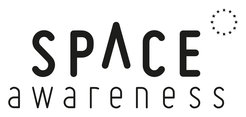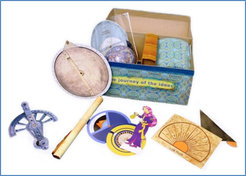EU Space Awareness
EU Space Awareness: An education project for school children of all ages

The Haus der Astronomie is involved in the EU Space Awareness (EUSPACE-AWE) education project, which received € 2 million in funding from the European Union between March 2015 and February 2018 through the Horizon 2020 program. The Haus der Astronomie was one of ten participating institutes and 15 network partners across 17 European countries and South Africa. The project was spearheaded by the University of Leiden in the Netherlands.
The education program uses the fascination of space to spark an interest among children and young people in science and technology, while also aiming to promote a global sense of solidarity and environmental awareness. The long-term vision of the initiative is ultimately to increase the number of young people who decide to pursue a career in the field of space science and technology.

Left: Artist’s impression of the Sentinel-1 satellite of the Copernicus Programme.
Right: Artist’s impression of the Galileo network.
ESA space programs are used to illustrate the variety of topics, although a special focus is placed on the Copernicus and Galileo projects.
At the Haus der Astronomie we have developed a total of 44 new educational materials. 15 of these are based on the topic “Our fragile planet”, which consists of various related units focusing on climate change. Moreover, an experiment kit filled with inexpensive and easy to find materials was developed to complement the existing teaching materials. You can put together your own “climate suitcase” based on the example below.

A demonstration model of the climate suitcase.
A further topic we offer is “Navigation through the ages”. Five teaching resources trace the history of navigation from the Bronze Age to the Middle Ages, right through to modern methods such as GPS. The resources are designed to be as interactive as possible to encourage children and young people to grasp and apply these methods on their own.

A demonstration model of the experiment kit for the Journey of Astronomical Ideas.
A third collection of teaching materials entitled “The Journey of Astronomical Ideas” comprises 24 activities describing the development of astronomy as a journey through civilization. Beginning in Babylon, it illuminates important discoveries during the blossoming of civilizations such as Ancient Egypt and Ancient Greece, as well as the Golden Age of Islam in order to include and contextualize the until now most overlooked group of migrants. A handbook and an experiment box round off the collection.
EUSPACE-AWE is integrated into the existing HdA activities such as teacher training courses and workshops. We also harness synergies with established HdA education programs such as UNAWE.
All materials have been assessed by experts in science and education and are published on AstroEDU, the International Astronomical Union’s website for educational materials. They are available free of charge and can be adapted to suit all lesson plans. The majority of the resources are currently available in English language. Please contact us if you would like a German-language version.
External staff
Dr. Hassane Dahrmaoui, Al Akhawayn University, Ifrane, Morocco
Rajae Saidi, Ecole Maternelle chez Le Mûrier, Ifrane, Morocco
Prof. Harald Lesch, Ludwigs-Maximilians University, Munich, Germany
More information
EU Space Awareness
EU Space Awareness project website
ESA Homepage
European Space Agency homepage
Horizon 2020
German Federal Ministry of Education and Research webpage on the Horizon 2020 program in German language
http://www.copernicus.eu
EU website on the Copernicus program
Copernicus Germany
Copernicus in Germany website
Galileo at ESA
Galileo project webpage of ESA website
European Global Navigation Satellite Systems Agency
Overview of all European global satellite navigation programs, including Galileo



